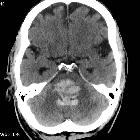Brainstem infarct syndromes


Brainstem stroke syndromes, also known as crossed brainstem syndromes, refer to a group of syndromes that occur secondary to lesions, most commonly infarcts, of the brainstem.
Epidemiology
Although many different brainstem stroke syndromes have been classically described, the majority appear extremely rarely in the literature and are mainly for historical interest only . The most common brainstem stroke syndrome seems to be the lateral medullary syndrome (Wallenberg syndrome) .
Clinical presentation
Each brainstem stroke syndrome has a characteristic clinical picture according to the involved area, however, generally, there is ipsilateral cranial nerve palsy and contralateral hemiplegia/hemiparesis and/or hemisensory loss .
The rule of 4 of the brainstem is a useful and simple clinical tool to aid in the anatomical localization of signs and symptoms in a brainstem stroke .
Pathology
Etiology
These syndromes are classically caused by ischemic strokes that occur secondary to occlusion of small perforating arteries of the posterior circulation, however many have also been described secondary to hemorrhage, neoplasm, and demyelination .
Classification
Brainstem stroke syndromes are most commonly classified anatomically.
Midbrain
Pons
- Brissaud-Sicard syndrome
- facial colliculus syndrome
- Gasperini syndrome
- Gellé syndrome
- Grenet syndrome
- inferior medial pontine syndrome (Foville syndrome)
- lateral pontine syndrome (Marie-Foix syndrome)
- locked-in syndrome
- Millard-Gubler syndrome
- Raymond syndrome
- Raymond-Cestan syndrome
Medulla oblongata
- Avellis syndrome
- Babinski-Nageotte syndrome
- Cestan-Chenais syndrome
- hemimedullary syndrome (Reinhold syndrome)
- Jackson syndrome
- lateral medullary syndrome (Wallenberg syndrome)
- medial medullary syndrome (Dejerine syndrome)
- Schmidt syndrome
- Spiller syndrome
- Tapia syndrome
- Vernet syndrome (often not caused by a brainstem lesion)
Siehe auch:
- Ponsblutung
- Wallenberg-Syndrom
- Ponsinfarkt
- Infarkt hinteres Stromgebiet
- Weber-Syndrom
- Hypertrophe Degeneration der Olive
- hämorrhagischer Ponsinfarkt
- Dejerine-Spiller-Syndrom
- Foville-Syndrom
- Marie-Foix-Alajouanine Syndrom
- Claude-Syndrom
- Benedikt-Syndrom
- alternierende Hemiplegie
und weiter:

 Assoziationen und Differentialdiagnosen zu Brainstem infarct syndromes:
Assoziationen und Differentialdiagnosen zu Brainstem infarct syndromes:







